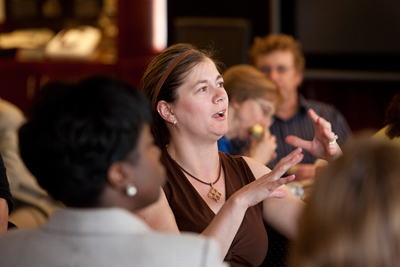Fuchs: Collaboration, not centralization, is the watchword
By Susan Kelley

The Cornell administration will collaborate more closely with operating units as the university strives to run more effectively while saving money, administrators said at a May 21 brown-bag lunch on the Initiatives Coordination Office's (ICO) progress.
"We can't work just in a totally centralized mode or in a totally decentralized mode. We have to set up systems and processes with clear guidelines so that units can feel that they're not having someone looking over their shoulders," Provost Kent Fuchs told about 25 people at the session, held in Schoellkopf Memorial Hall.
The informal forum was the last in a series this academic year of public discussions on the efforts to "reimagine Cornell" as a leaner, more academically excellent university.
The ICO's work on facilities and information technology are furthest along, said Paul Streeter, ICO director and associate vice president for planning and budget. President David Skorton and Fuchs have accepted both teams' recommendations, which should be made public in a few weeks, Streeter said.
Many relate to defining the organizational roles that the central administration and operating units will play during the implementation phase, Streeter said. For example, because computer support is currently very fragmented, the central administration will collaborate with the various IT groups to reorganize it and limit the types of computers staff can order. "We allow just a huge spectrum now," he said. With fewer kinds of machines to maintain, "we can actually deploy more effective end-user tools."
When asked about the scope of the finance initiatives, Streeter said that most involve transaction processing. The university should roll out a new financial transaction processing system by July 2011, he said. "We haven't had a new financial system in 40 years."
As for metrics, Streeter said ICO teams are identifying the right metrics as part of the planning process. One is the university's annual administrative savings. Initial estimates of $90 million annually by 2015 are now closer to $78 million, Streeter said.
In response to a question about communication, Fuchs noted that none of these initiatives are in lockstep with each other, which sometimes makes progress hard to delineate, he said. "I acknowledge that it's frustrating that there aren't these clear points where we say, 'We're done.'"
What impact will the state budget have on the initiatives? In a sense, none, Fuchs said. But it will affect how quickly the university whittles down its $40 million operating budget deficit. Every week the administration gets mixed news on that front, he added. For example, a better than expected endowment performance was offset by the fact that more students' families will need financial aid next fall than had been anticipated, Fuchs said. "But we'll solve the deficit problem."
When asked when units would be able to integrate facilities costs into their budgets, Elmira Mangum, vice president for planning and budget, responded that she is forming subcommittees to address issues related to a new budget model. She plans to have their recommendations, and feedback from the campus, combined into a plan in time for next year's budget cycle. "That's really aggressive, but I think it's important that the budget model be something that the university community creates together."
Fuchs ended the session by thanking the participants for their work. "This has been a hard year, with stress and strain over student deaths, the flu epidemic, the economy," he concluded. "But I'm really pleased with where we are and where we're going. Thank you all for the role you've played."
Media Contact
Get Cornell news delivered right to your inbox.
Subscribe